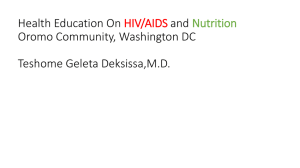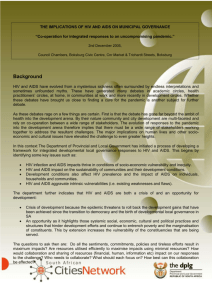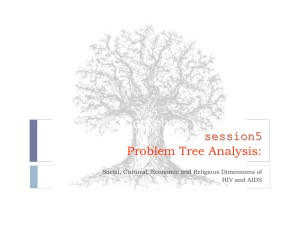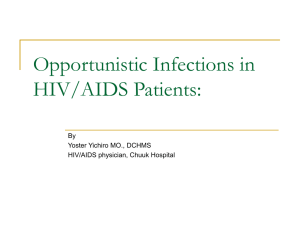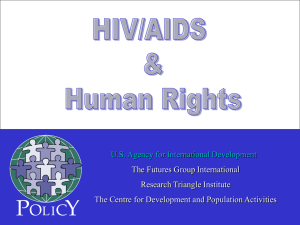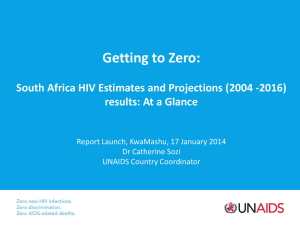programme for development of local government leadership in the
advertisement
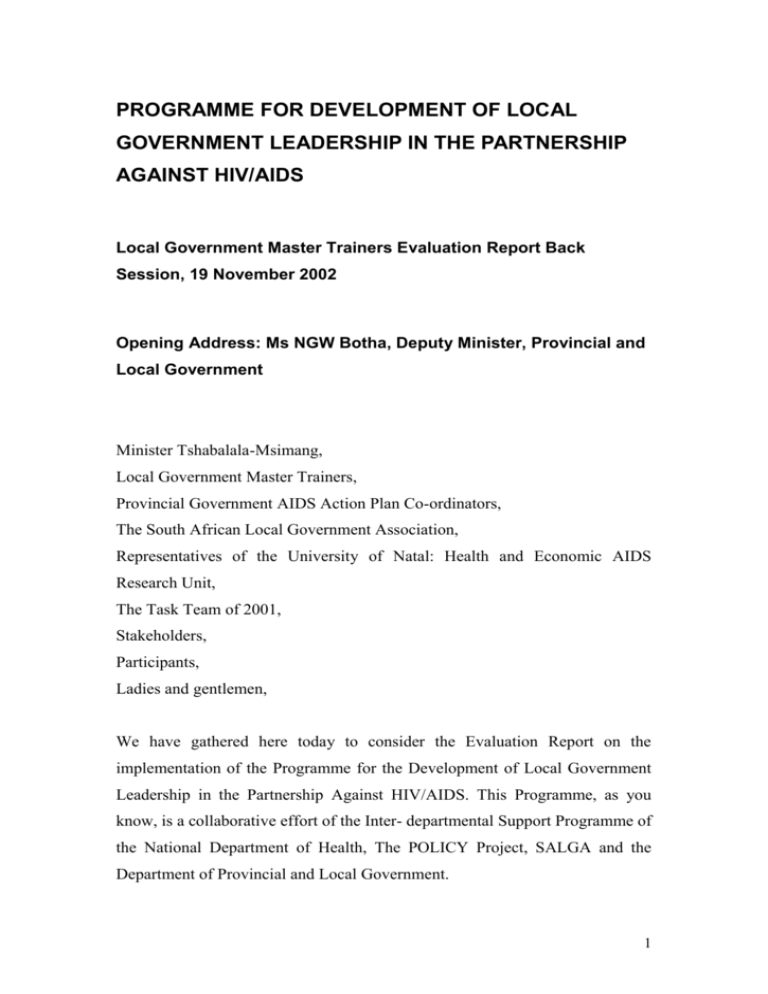
PROGRAMME FOR DEVELOPMENT OF LOCAL GOVERNMENT LEADERSHIP IN THE PARTNERSHIP AGAINST HIV/AIDS Local Government Master Trainers Evaluation Report Back Session, 19 November 2002 Opening Address: Ms NGW Botha, Deputy Minister, Provincial and Local Government Minister Tshabalala-Msimang, Local Government Master Trainers, Provincial Government AIDS Action Plan Co-ordinators, The South African Local Government Association, Representatives of the University of Natal: Health and Economic AIDS Research Unit, The Task Team of 2001, Stakeholders, Participants, Ladies and gentlemen, We have gathered here today to consider the Evaluation Report on the implementation of the Programme for the Development of Local Government Leadership in the Partnership Against HIV/AIDS. This Programme, as you know, is a collaborative effort of the Inter- departmental Support Programme of the National Department of Health, The POLICY Project, SALGA and the Department of Provincial and Local Government. 1 The Evaluation Report contains many important observations and recommendations, and goes a long way towards assisting local government develop more effective responses to HIV/AIDS. Before I officially open this Evaluation Feedback Meeting, I wish to highlight some of the points made in the Report, lest I do not get another opportunity to do so. Local Context of HIV/AIDS Responses Local actions need to take place on the basis of knowledge. An effective local government strategy needs to be based on an understanding of the impact of HIV/AIDS on the economy and social infrastructure of cities, towns and districts (`external impact’) and on local government institutional capacity and provision of municipal services (`internal impact’). An external risk assessment includes measuring the potential impact of HIV/AIDS on major employers and supply networks, vulnerable economic sectors and local labour markets, taking into consideration declining population growth, changing age structure of the population, changing income and expenditure patterns, as well as differentiated geographic prevalence of HIV/AIDS within the municipal area. An internal risk assessment focuses on the potential impact of HIV/AIDS on the municipal administration, including loss of skilled personnel, rising costs of retraining and absenteeism, projected loss of local government income, increasing budget pressures, changing financial lending policies of the private sector, pressure on municipal health services, increasing demand for land for cemeteries, incidence of pauper burials and poverty-relief programmes. 2 HIV/AIDS as a Developmental Issue A local government leadership programme needs to be aimed at challenging the persistent misconception within many municipalities that HIV/AIDS is just a `health’ issue. A training programme should aim to promote an integrated, multi-sectoral, crosscutting programme of action within each municipality. Role of Local Government A leadership-training programme should be based on increasing the understanding of the role of municipalities. This includes the role of municipalities in mobilising communities and forming multi-stakeholder partnerships around local intervention, and `mainstreaming’ the implementation of HIV/AIDS programmes within the municipality itself. Key lessons from municipalities to date include: The importance of establishing local AIDS Councils representing a wide range of community-based organisations, non-governmental organisations, donors, faith-based groups and local business; The need for a more explicit intergovernmental and multi-sectoral approach, based on a clear definition of roles and responsibilities of the different spheres and sectors of government; The need to move beyond pilot projects in a limited number of localities towards an equitable, municipal-wide approach for all communities, while still being sensitive to economic and geographic differences, The importance of ward-based programmes, involving both the ward councillor and ward committee members. Local interventions need to be multi-faceted, dealing with: Prevention through education, Provision of a continuum of treatment, care and support, including counselling, voluntary testing, mother to child transmission prevention, 3 wellness programmes, home-based care, hospice and estate planning, death and burial services and bereavement support, Targeting of vulnerable groups such as children and orphans, De-stigmatisation and anti-discrimination campaigns, The establishment of a local database on HIV infections and AIDS deaths, disaggregated on the basis of age, gender, race and geographic area, Ongoing monitoring and evaluation of programmes. Coordination of actions within municipalities For HIV/AIDS to be dealt with as a developmental issue, it needs to be mainstreamed within the municipality, and not regarded as an `add-on’ to the existing programmes of the municipal health department. One way to do this is to make HIV/AIDS a central organising theme of the municipal IDP, annual budget, departmental business plans and performance management system. An effective municipal HIV/AIDS intervention plan needs to specify roles and responsibilities of the various municipal departments. Of particular importance are the responses around land-use planning, water and sanitation, housing, libraries, municipal buildings, cemeteries, community services, poverty-relief programmes, NGO-funding programmes, as well as treasury and human resources. A municipality also needs to have workplace strategies in place to deal with the impact of HIV/AIDS on municipal staff and Councillors. These include: Prevention responses, such as information, education and awareness, personal protection in accident situations, access to condoms and voluntary testing, 4 Care responses, such as counselling for employees, health packages, and protection of rights of employees, Management responses, such as an annual impact assessment (e.g. financial costs; employee benefits) and the development of a skills succession plan, A partnership with the labour unions, and, An HIV/AIDS policy for Councillors. Appropriate structures for coordination within the municipality are central to an integrated response. An effective municipal HIV/AIDS programme needs to be championed at a senior political and managerial level within the municipality, and resourced accordingly. I wish to brief you on the progress of a relatively new project that the Department of Provincial and Local Government is involved in with relevance to today’s meeting, namely, the South African Cities Network (Cities Network). The Cities Network, which was launched on 07 October 2002, is an information and knowledge-sharing network focusing on issues central to the governance of large metropolitan areas. One of the thematic programmes of the Cities Network is aimed at promoting more effective city responses to HIV/AIDS. Recent research by DPLG and the Cities Network has shown that urban areas generally, and cities in particular, tend to have higher prevalence rates than their respective provinces1. Although cities usually have more resources than medium-sized towns and rural areas to address the challenges of HIV/AIDS, they tend to be faced with issues of greater magnitude and complexity. Mirjam van Donk (2002), `HIV/AIDS and Urban Poverty in South Africa’, in `Urban Poverty in South Africa’ (2002), report prepared for DPLG and SA Cities Network by Palmer Development Group and Isandla Institute 1 5 Notwithstanding the recommendation of the Evaluation Report that future rollout be targeted mainly towards Category `B’ municipalities, it is important that councillors and officials responsible for governance in the major metropolitan areas cities also receive training and support. Information and knowledge sharing methodology The main aim of the Cities Network HIV/AIDS programme is on assisting city municipalities to become `AIDS-competent municipalities’. This is done through the establishment of a common city framework of responses and interventions through which city municipalities can learn from each other and from other cities in developing countries. The Cities Network utilises a range of methodologies for information and knowledge sharing among city municipalities. These include: Documentation of `local success stories’ as part of an Innovations and Best Practice Programme (e.g. `Innovation from Msunduzi Municipality, KwaZulu-Natal’); Research and case studies (e.g. `HIV/AIDS in the Nelson Mandela Metropolitan area’); Peer review of city HIV/AIDS programmes (the first peer review is planned for April 2003); Workshops (e.g. a workshop focusing on municipal workplace strategies is planned for 22 November 2002 in Johannesburg); Establishment of a cities HIV/AIDS working group with a programme of quarterly meetings; Partnerships with other networks (e.g. Alliance of Mayors and Municipal Leaders on HIV/AIDS in Africa, and Cities Alliance); Web-based information (see www.sacities.net). 6 Although the Cities Network HIV/AIDS programme is still in its infancy, a range of lessons and recommendations have been generated, many of which accord closely with the outcomes of the Local Government Master Trainers Evaluation Report. While some of the suggested strategies are city-specific, the lessons can be applied more generally to local government as a whole. In conclusion, I wish to congratulate all those involved in the Programme for Development of Local Government Leadership in the Partnership against HIV/AIDS. I believe that the training of the Master Trainers, and the subsequent rollout training workshops will have a positive impact on our ability to develop more effective local government responses to HIV/AIDS. Our strategic objective as Government is to eradicate poverty and improve the quality of the lives of all South Africans. Municipalities are therefore best placed to meet this objective and have a responsibility to work with local communities to find sustainable ways to meet their social, economic and material needs. This programme will go a long way in ensuring that this objective is realised. I wish you well in your deliberations during the next three days and now declare this meeting open. I thank you for your attention. 7
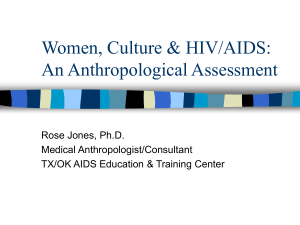
![Africa on the rise - Health[e]Foundation](http://s2.studylib.net/store/data/005761249_1-4e2609b64b2c374f99ff6e9dbe45edb8-300x300.png)
